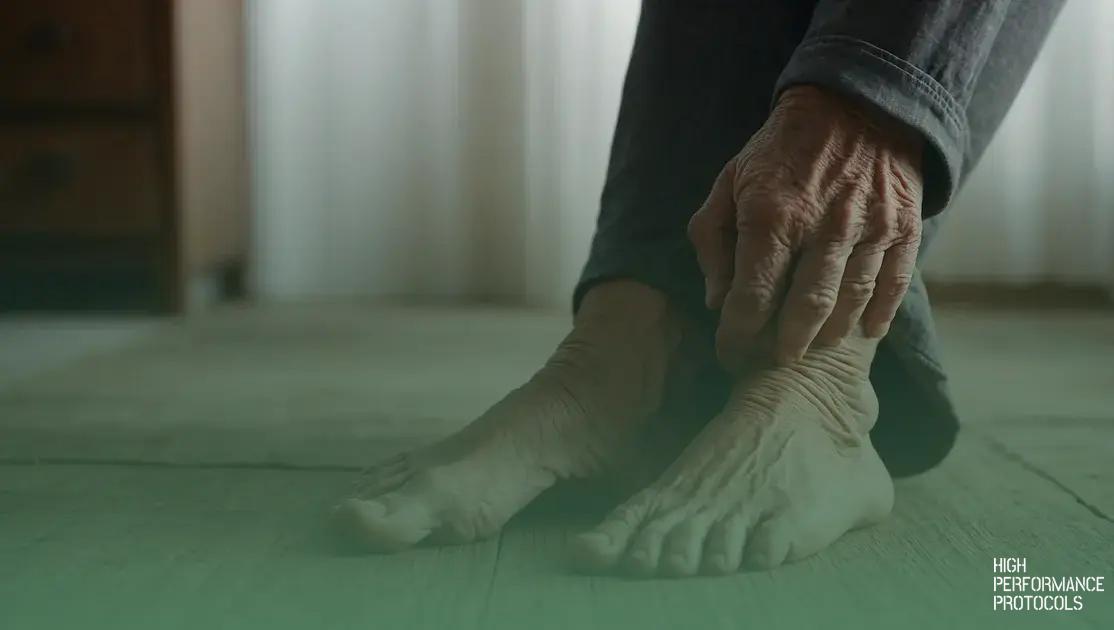Peripheral neuropathy is a condition characterized by symptoms like tingling, numbness, and pain in the limbs. Effective management involves medications, physical therapy, and lifestyle changes. It’s crucial to see a doctor if symptoms persist or worsen, especially for those with diabetes.
If you’re dealing with Peripheral Neuropathy, you’re not alone. This condition can bring about a range of uncomfortable symptoms that affect your daily life. Let’s explore effective ways to manage these challenges!
What is Peripheral Neuropathy?
Peripheral neuropathy is a condition that affects your nerves. These nerves carry messages from your brain and spinal cord to the rest of your body. When they are damaged, it can cause problems. You might feel pain, numbness, or weakness, especially in your hands and feet.
It can happen for many reasons. Diabetes is one common cause. Over time, high blood sugar can harm your nerves. Other causes include injuries, infections, and certain medications. Sometimes, hereditary factors play a role too.
This condition can affect anyone, but it is more common in adults. If you have symptoms, it’s important to see a healthcare provider. They can help figure out what’s going on and suggest ways to feel better.
Understanding peripheral neuropathy is the first step toward managing it. Knowing what it is and what causes it can help you take control of your health.
Symptoms and Risk Factors
People with peripheral neuropathy often notice several symptoms. The most common include tingling or prickling sensations. You might also feel numbness or a burning pain in your feet or hands. These feelings can make it hard to do everyday tasks.
Some may experience weakness in their limbs. This can affect your balance and coordination. If you notice these symptoms, it’s good to talk to a doctor.
Several risk factors can increase your chances of developing peripheral neuropathy. One major factor is diabetes. Around half of people with diabetes may have some nerve damage.
Other factors include being older, drinking too much alcohol, and having certain diseases. Infections and exposure to toxins can also harm your nerves. If you have a family history of nerve issues, you might be at a higher risk too.
Effective Management Strategies
Managing peripheral neuropathy involves a mix of treatments and lifestyle changes. First, it’s important to work with your doctor to find the right plan. Medications can help relieve pain and other symptoms. You might need over-the-counter options or prescription drugs.
Physical therapy can also be beneficial. A therapist can teach you exercises to improve strength and balance. This can help you stay active and reduce the risk of falls.
Another key aspect is your diet. Eating healthy foods can support nerve health. Focus on fruits, vegetables, whole grains, and lean proteins. Staying hydrated is important too.
Managing blood sugar levels is essential for those with diabetes. Keep track of your levels and follow your doctor’s advice. Regular check-ups with your healthcare provider can help catch issues early.
Additionally, consider complementary therapies. Techniques like acupuncture, massage, or yoga may provide relief. These approaches can help you relax and manage stress.
When to Seek Medical Help
Knowing when to seek medical help for peripheral neuropathy is important. If you notice unusual symptoms, don’t wait too long. Early diagnosis can make a big difference.
If you experience persistent tingling or numbness, reach out to your doctor. These symptoms can indicate nerve damage that needs attention. Burning pain or weakness in your limbs are also signs to watch for.
It’s especially important to see a doctor if you have diabetes. Regular check-ups can help prevent or manage nerve issues. If your symptoms suddenly worsen, seek help right away.
Don’t ignore signs of a possible injury. If you can’t feel your feet properly, you may not notice cuts or sores. These can lead to serious problems if left untreated.
Consult a healthcare professional if your daily life is affected. They can help you find ways to manage your symptoms and improve your quality of life.
Understanding and Managing Peripheral Neuropathy
Peripheral neuropathy can be challenging, but you’re not alone. Many people face similar issues and find ways to manage them. By recognizing the symptoms and understanding the risk factors, you can take steps to improve your situation.
Effective management strategies, including medications, therapy, and a healthy lifestyle, can lead to better days. Remember, it’s important to talk to your doctor about your symptoms and seek medical help when needed.
With the right support and knowledge, you can take control of your health and live a more active life despite having peripheral neuropathy.
FAQ – Frequently Asked Questions about Peripheral Neuropathy
What are the common symptoms of peripheral neuropathy?
Common symptoms include tingling, numbness, and burning pain in your hands or feet.
When should I see a doctor for my symptoms?
You should see a doctor if symptoms persist or worsen, especially if you have diabetes.
How can I manage my peripheral neuropathy?
Management includes medications, physical therapy, and a healthy diet to support nerve health.
Are there specific risk factors for developing this condition?
Yes, diabetes, older age, alcohol use, and family history are known risk factors.
Can physical therapy help with peripheral neuropathy?
Yes, physical therapy can improve strength, balance, and help manage symptoms.
What should I do if I notice a cut or sore on my foot?
If you can’t feel it due to numbness, see a doctor right away to avoid serious complications.

Max is a health and wellness researcher dedicated to optimizing human performance through science-backed protocols. As a contributor to High Performance Protocols, he analyzes the latest medical studies and translates complex research into practical, easy-to-follow strategies for improving energy, longevity, and overall well-being. Passionate about biohacking, nutrition, and evidence-based health solutions, Max Reynolds helps readers navigate the ever-evolving world of health optimization with clarity and precision.
